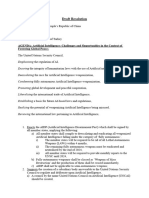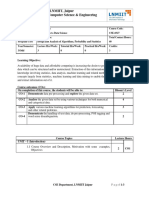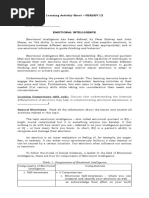0 ratings0% found this document useful (0 votes)
4 viewsWa0001
Wa0001
Uploaded by
thiruspk70Copyright:
© All Rights Reserved
Available Formats
Download as DOCX, PDF, TXT or read online from Scribd
Wa0001
Wa0001
Uploaded by
thiruspk700 ratings0% found this document useful (0 votes)
4 views6 pagesOriginal Title
DOC-20240831-WA0001
Copyright
© © All Rights Reserved
Available Formats
DOCX, PDF, TXT or read online from Scribd
Share this document
Did you find this document useful?
Is this content inappropriate?
Copyright:
© All Rights Reserved
Available Formats
Download as DOCX, PDF, TXT or read online from Scribd
Download as docx, pdf, or txt
0 ratings0% found this document useful (0 votes)
4 views6 pagesWa0001
Wa0001
Uploaded by
thiruspk70Copyright:
© All Rights Reserved
Available Formats
Download as DOCX, PDF, TXT or read online from Scribd
Download as docx, pdf, or txt
You are on page 1of 6
Committee: General Assembly 1st Committee: Disarmament and
International Security Committee (DISEC)
Topic: Ethical frameworks for the development and use of AI in weaponry
Sponsor: The Russian Federation, People's Republic of China
Signatories: The Kingdom of Denmark, The Republic of Philippines, The
Republic of Austria, The Republic of Yemen, The Republic of Indonesia, The
Arab Republic of Egypt, The Republic of Colombia, The federation of
Malaysia, United States of America, Japan, Federal Republic of Germany,
The United Kingdom, The State of Palestine, The Kingdom of Spain, The
federal Republic of Nigeria, United Arab Emirates, The Republic of Estonia,
The Republic of Türkiye, The Republic of Singapore, The Republic of India,
The Kingdom of Saudi Arabia, Greece(Hellenic Republic), The Italian
Republic, The Republic of Finland, The Democratic People's Republic of
Korea, Swiss Confederation, The Republic of Lebanon, Federative Republic
of Brazil, The Republic of Syria, State of libya, The Grand Duchy of
Luxembourg, The State of Israel, The State of Palestine, Democratic
Republic of Congo, The Commonwealth of Australia, The people’s republic
of Bangladesh
The General Assembly,
Acknowledging that artificial intelligence (AI) technologies have the
potential to significantly impact society, bringing both unprecedented
opportunities and challenges, particularly in the fields of securities and
defence,
Affirming the centrality of human control and accountability in the
development and use of Al systems, especially in contexts where such
systems could make decisions that affect life and death, and AI should not
be operated without human over sight,
Recognizing the rapid advancement of artificial intelligence and its
increasing integration into military weaponry, we acknowledge the need for a
comprehensive ethical framework to guide the development, deployment, and
use of Al-powered weapons,
Stressing the importance of establishing ethical guidelines and international
standards for Al development, ensuring that Al systems are transparent,
explainable, and subject to rigorous oversight to prevent misuse and
unintended consequences,
Reaffirming the crucial importance of international humanitarian law,
especially the Geneva Conventions, in regulating warfare conduct and
safeguarding civilians,
Acknowledging with concern that the absence of standardized ethical
guidelines for AI in weaponry could trigger an arms race and destabilize
global security,
Mindful of previous United Nations resolutions and other international
bodies that highlight the importance of ethical considerations in the
development and deployment of emerging technologies,
Affirming the necessity of continuous dialogue and collaboration among
member states to address the ethical implications of AI in weaponry and to
develop effective regulatory frameworks,
Recognizing the significance of involving a diverse array of stakeholders,
including governments, military leaders, AI developers, ethicists, and civil
society, in the formulation of ethical guidelines for AI in weaponry,
1. Encourages the adoption of the Human-in-the-Loop Principle, which
mandates that human operators retain control over the decision to use
lethal force, ensuring that AI weapons systems are not fully autonomous
in engaging targets, in alignment with international humanitarian law
and emphasizing human responsibility in military actions;
2. Establishes an international regulatory body under the United Nations to
oversee the development and deployment of AI in weaponry, tasked
with:
a) Developing global ethical standards,
b) Monitoring compliance among member states,
c) Providing recommendations for best practices in the ethical use
of AI weaponry;
3. Calls for all member states to conduct Ethical Impact Assessments (EIAs)
for AI weapon systems prior to their development and deployment,
ensuring that:
a) These assessments evaluate potential ethical risks, impact
on civilians, and long-term consequences,
b) The findings of these assessments are made publicly
available and shared with the international community;
4. Encourages the establishment of mandatory AI ethics training programs for
military personnel, AI developers, and policymakers involved in AI weaponry,
including:
a) The development of a standardized training curriculum,
b) Organization of workshops and seminars by the United
Nations to disseminate these programs globally;
5. Urges the introduction of mandatory transparency and reporting
mechanisms where states report on the development, testing, and
deployment of AI weapon systems, with:
a) Reports including information on ethical considerations
and compliance with international standards,
b) Establishing a central database managed by the United
Nations for international review of these reports;
6. Calls for a moratorium on the development and deployment of fully
autonomous lethal weapons until ethical frameworks and regulatory
measures are fully established, and:
a) Encourages member states to halt programs related to fully
autonomous weapons,
b) Suggests a timeline for reviewing the moratorium based on
progress in ethical frameworks;
7. Recommends the establishment of a Global AI Ethics Repository, a secure,
transparent platform where member states can:
a) Voluntarily share information on AI weaponry development and ethical
considerations,
b) Access research, ethical impact assessments, and best practices from
other nations,
c) Engage in collaborative projects aimed at improving ethical standards;
8. Recommends the creation of a Global AI Ethics Forum, an annual conference
hosted by rotating member states, where:
a) Government representatives, military officials, AI developers, and
ethicists gather to discuss the latest developments in AI weaponry and
ethical frameworks,
b) The forum serves as a platform for sharing success stories, challenges,
and updates on compliance with international ethical standards,
c) It provides opportunities for collaborative projects and the development
of new ethical guidelines;
9. Encourages international collaboration on the ethical development of AI
in weaponry through:
a) Sharing of best practices,
b) Joint research initiatives,
c) Exchange of experts among member states;
10. Recommends utilizing the Convention on Certain Conventional Weapons
(CCW) as a platform for negotiating regulations on AI weapons, particularly
autonomous systems, by extending the CCW's mandate to include AI, thereby
ensuring that states agree on limitations and protections concerning lethal
autonomous weapons systems (LAWS);
11. Calls upon all member states to ensure that the integration of Lethal
Autonomous Weapons Systems (LAWS) in military applications strictly adheres
to the principles of International Humanitarian Law (IHL), including:
a) Distinction: Ensuring that AI systems can accurately differentiate
between combatants and non-combatants,
b) Proportionality: Guaranteeing that the use of AI in weaponry does
not result in excessive harm relative to the military advantage
gained,
c) Necessity: Confirming that AI deployment is essential and justified
in the context of military operations;
12. Encourage member states to invest in collaborative research and
development initiatives aimed at creating ethical AI systems for military
applications:
a) Joint projects between countries to explore the safe integration of AI in
weaponry,
b) Shared resources and expertise to develop technologies that adhere to
ethical standards;
13. Regulates LAWS featuring decision-making autonomy in critical functions
that can be developed and used in full compliance with IHL. Compliance should
be assessed by:
a) Evaluating existing capacities of the systems,
b) Applying appropriate testing and training of human operators to ensure
reliability, understandability, and predictability,
c) Limiting the types of targets, duration, geographical scope, and scale of
operations,
d) Ensuring intervention by a human operator during crucial, “high-level”
functions;
14. Proposes the adoption of AI Ethics Transparency Pledges, where:
a) Member states voluntarily commit to transparency in the development
and deployment of AI weaponry,
b) These pledges include the publication of annual reports detailing AI
projects, ethical considerations, and measures taken to comply with
international standards,
c) The pledges are recognized as a symbol of commitment to ethical AI use
and can be used as a basis for international cooperation and trust-
building;
15. Proposes the establishment of AI Ethics Advisory Panels to provide
ongoing guidance and ethical assessments for emerging AI technologies:
a) These panels should be independent and include technologists,
military experts, and other relevant stakeholders to ensure a
comprehensive evaluation of AI technologies,
b) The primary goal of these panels is to ensure that AI
technologies meet the highest ethical standards and contribute to
international peace and security.
You might also like
- Puros-S and - S2 BrochureDocument4 pagesPuros-S and - S2 BrochureTiến Khổng MinhNo ratings yet
- The-Law-of-the-Sea-Notes (Charts, Diagrams and Maps)Document4 pagesThe-Law-of-the-Sea-Notes (Charts, Diagrams and Maps)Muhammad NaguibNo ratings yet
- Draft Resolution by The USA-Japan BlocDocument5 pagesDraft Resolution by The USA-Japan Blocthiruspk70No ratings yet
- Wa0032Document4 pagesWa0032thiruspk70No ratings yet
- Working PaperDocument4 pagesWorking PaperSoorya PNo ratings yet
- GYLS Sample 3Document7 pagesGYLS Sample 3sanjit75204No ratings yet
- DR TRIPLE DEFENDERSDocument6 pagesDR TRIPLE DEFENDERSgaceituno.20No ratings yet
- Mcmun PDDocument6 pagesMcmun PDsanjulav11No ratings yet
- DocumentDocument4 pagesDocumenthamouda7ahmedNo ratings yet
- jmc mun 2024Document3 pagesjmc mun 2024aayushchoraria11No ratings yet
- Draft ResolutionDocument4 pagesDraft Resolutionteppecennet296No ratings yet
- 2 FORUM: General Assembly 1 Main Submitter: India CO-SUBMITTERS: Bolivia, Morocco, Democratic People's Republic of KoreaDocument3 pages2 FORUM: General Assembly 1 Main Submitter: India CO-SUBMITTERS: Bolivia, Morocco, Democratic People's Republic of KoreaMinh VuNo ratings yet
- MUN LibyaDocument5 pagesMUN LibyaLeanna MassarNo ratings yet
- Draft Resolution 5.0Document2 pagesDraft Resolution 5.0daveymilan36No ratings yet
- FranceDocument3 pagesFrancehamouda7ahmedNo ratings yet
- Draft ResolutionDocument24 pagesDraft Resolutionharshinikalakuntla09No ratings yet
- DR ChinaDocument2 pagesDR China47x9bw5tpqNo ratings yet
- PositioDocument10 pagesPositioabahuguna2007No ratings yet
- Mun helper AMDocument1 pageMun helper AMchiaalb13No ratings yet
- Laws For LAWSDocument3 pagesLaws For LAWShhhNo ratings yet
- NDSA Topic 2Document4 pagesNDSA Topic 2hamouda7ahmedNo ratings yet
- Draft Resolution 1.1Document2 pagesDraft Resolution 1.1punnyakhemaniNo ratings yet
- Draft Conconlusions April2023ggeDocument4 pagesDraft Conconlusions April2023ggeBhavan SaiNo ratings yet
- Resolution Space (IVMUN 2020)Document4 pagesResolution Space (IVMUN 2020)hayamoloo0408No ratings yet
- Indian DRDocument3 pagesIndian DRsrinikeshdurgavajjulaNo ratings yet
- PP Disec IndonesiaDocument2 pagesPP Disec IndonesiachampionNo ratings yet
- Draft RESOLUTIONDocument8 pagesDraft RESOLUTIONaman.ishratiNo ratings yet
- MMR1 (English)Document9 pagesMMR1 (English)Milena PopovicNo ratings yet
- WarbotDocument22 pagesWarbotDhanya SonuNo ratings yet
- DR - 1.XDocument20 pagesDR - 1.XAdhiswaraNo ratings yet
- Draft Resolution (Pink City)Document4 pagesDraft Resolution (Pink City)bakersi.o2009No ratings yet
- DSMUN Better Bloc ResolutionDocument8 pagesDSMUN Better Bloc Resolutionaashna kumarNo ratings yet
- DR 1Document4 pagesDR 1Siya AgrawalNo ratings yet
- Draft Resolution 4.0Document3 pagesDraft Resolution 4.0Siya AgrawalNo ratings yet
- Draft Resolution 1.1Document12 pagesDraft Resolution 1.1pashaanehNo ratings yet
- Artificial Intelligence in Conflict ZonesDocument2 pagesArtificial Intelligence in Conflict ZonesMinh VuNo ratings yet
- DR-4 1 0Document3 pagesDR-4 1 0SUHRAT TAHSIN (201917)No ratings yet
- UNESCODocument5 pagesUNESCOAliNo ratings yet
- A39-19: Addressing Cybersecurity in Civil AviationDocument2 pagesA39-19: Addressing Cybersecurity in Civil Aviationmasaadah79No ratings yet
- Working Paper 4.0Document2 pagesWorking Paper 4.0Siya AgrawalNo ratings yet
- A40-10: Addressing Cybersecurity in Civil AviationDocument2 pagesA40-10: Addressing Cybersecurity in Civil Aviationmasaadah79No ratings yet
- Background Consultation Trustworthy GeneralPurpose AI qzPK5TwHc7P1pqkaTPldeYSmQo 107766Document5 pagesBackground Consultation Trustworthy GeneralPurpose AI qzPK5TwHc7P1pqkaTPldeYSmQo 107766Carlos UlloaNo ratings yet
- 2018 Ga1 1 10Document6 pages2018 Ga1 1 10Jason BaekNo ratings yet
- POWERPOINT - AI and Armed ConflictsDocument34 pagesPOWERPOINT - AI and Armed ConflictsGengisWolffNo ratings yet
- Issue 1Document3 pagesIssue 1nguyenquynhhan028No ratings yet
- Resolution 420 - 69Document3 pagesResolution 420 - 69Cubing, D.I.Y n moreNo ratings yet
- DR1.2Document3 pagesDR1.2torizhang2046No ratings yet
- Position Paper - DPRKDocument2 pagesPosition Paper - DPRKfaiyazrashid648No ratings yet
- Mun 2023 Draft 1Document2 pagesMun 2023 Draft 1dsk.akulaNo ratings yet
- UNSC ADocument7 pagesUNSC ADavid BoktorNo ratings yet
- Article About Challenges of IHLDocument7 pagesArticle About Challenges of IHLabdihakimhassan1014No ratings yet
- Iran'resolutionDocument3 pagesIran'resolutionhamouda7ahmedNo ratings yet
- Abstrac 0Document2 pagesAbstrac 0rwilson20No ratings yet
- Bio-Chem Weapons Resolution (Approved)Document8 pagesBio-Chem Weapons Resolution (Approved)Hong Kong MUN 2013No ratings yet
- Draft Res 1.0Document5 pagesDraft Res 1.0Harshil WaliaNo ratings yet
- DR POV you travel to the westDocument5 pagesDR POV you travel to the westgaceituno.20No ratings yet
- Resolution A41-19: Addressing Cybersecurity in Civil AviationDocument3 pagesResolution A41-19: Addressing Cybersecurity in Civil Aviationmasaadah79No ratings yet
- Draft Res 1.0Document5 pagesDraft Res 1.0Harshil WaliaNo ratings yet
- Working Paper ExampleDocument2 pagesWorking Paper ExamplePAULA BRENA DAVILANo ratings yet
- DR NATODocument6 pagesDR NATOgaceituno.20No ratings yet
- GA1 - 2 - CanadaDocument3 pagesGA1 - 2 - CanadaMinh VuNo ratings yet
- Preparation, Conduct and Evaluation of Exercises for Detection of and Response to Acts Involving Nuclear and Other Radioactive Material out of Regulatory Control: Technical GuidenceFrom EverandPreparation, Conduct and Evaluation of Exercises for Detection of and Response to Acts Involving Nuclear and Other Radioactive Material out of Regulatory Control: Technical GuidenceNo ratings yet
- Working Paper 2.0Document1 pageWorking Paper 2.0thiruspk70No ratings yet
- PVM Mun ListDocument4 pagesPVM Mun Listthiruspk70No ratings yet
- Working Paper v1Document2 pagesWorking Paper v1thiruspk70No ratings yet
- Tour InstructionsDocument4 pagesTour Instructionsthiruspk70No ratings yet
- Morated Cacus Topics For DisecDocument1 pageMorated Cacus Topics For Disecthiruspk70No ratings yet
- Useful Commands-BrocadeDocument1 pageUseful Commands-BrocadeMrityunjoy KunduNo ratings yet
- ED Higher Education Economic Development AfricaDocument90 pagesED Higher Education Economic Development AfricaHusenNo ratings yet
- Ids CifDocument3 pagesIds CifHAQNo ratings yet
- L Earning Activity Sheet - PERDEV 12: Learning Competency With Code: Discuss That Understanding The IntensityDocument13 pagesL Earning Activity Sheet - PERDEV 12: Learning Competency With Code: Discuss That Understanding The IntensityJohn Patrick PanchoNo ratings yet
- Decsci Reviewer CHAPTER 1: Statistics and DataDocument7 pagesDecsci Reviewer CHAPTER 1: Statistics and DataGabriel Ian ZamoraNo ratings yet
- SeaStar Tournament Series Cylinder Installation ManualDocument44 pagesSeaStar Tournament Series Cylinder Installation ManualCosmin CosminNo ratings yet
- College List With WebsiteDocument78 pagesCollege List With Websitebibhu prasad sahooNo ratings yet
- Revision sheet-EVM CSRDocument17 pagesRevision sheet-EVM CSRSiya HedaNo ratings yet
- Digital Signal Processing c1Document20 pagesDigital Signal Processing c1Meliza SiotingNo ratings yet
- Sumit ProjectDocument59 pagesSumit ProjectNileshNo ratings yet
- Among Digitized Manuscripts. Philology, Codicology, Paleography in A Digital WorldDocument345 pagesAmong Digitized Manuscripts. Philology, Codicology, Paleography in A Digital WorldMaximiliano EscobarNo ratings yet
- Advantages of Multidimensional Data ModelDocument6 pagesAdvantages of Multidimensional Data ModelKadir SahanNo ratings yet
- Foundations of Adaptive Project Delivery Agile Hands OnDocument3 pagesFoundations of Adaptive Project Delivery Agile Hands Onsankara28No ratings yet
- A Study On Internet As A Marketing Tool-SynopsisDocument4 pagesA Study On Internet As A Marketing Tool-SynopsisNageshwar singhNo ratings yet
- Development Administration in Nigeria: Jahangir KhanDocument10 pagesDevelopment Administration in Nigeria: Jahangir Khanjahangir khattakNo ratings yet
- WINSEM2022-23 STS2022 SS VL2022230500188 Reference Material I 19-01-2023 Simple EquationsDocument34 pagesWINSEM2022-23 STS2022 SS VL2022230500188 Reference Material I 19-01-2023 Simple EquationsTejaas MageshNo ratings yet
- AGS-Battery Tonic-Battery Distilled Water-SpecificationDocument1 pageAGS-Battery Tonic-Battery Distilled Water-SpecificationMuhammad YounusNo ratings yet
- Raz D - Who Runs FasterDocument12 pagesRaz D - Who Runs FasterMiloš PopadićNo ratings yet
- (samaneh)1-s2.0-S0960148118311170-mainDocument7 pages(samaneh)1-s2.0-S0960148118311170-mainArif RochmanNo ratings yet
- The Saussurean DichotomiesDocument10 pagesThe Saussurean DichotomiesHerpert ApthercerNo ratings yet
- 1BC - AMMONIUM BISULFATE (NH4HSO4) - SDS-US - EnglishDocument6 pages1BC - AMMONIUM BISULFATE (NH4HSO4) - SDS-US - EnglishAkhmad MaulanaNo ratings yet
- Examples of State VerbsDocument3 pagesExamples of State VerbsVivianaCristeaNo ratings yet
- 机经 231121 阅读P2 The Sound Revolution in American FilmDocument3 pages机经 231121 阅读P2 The Sound Revolution in American FilmDavid ZhaoNo ratings yet
- Antolijao, Gerlie M. - Bsmt2f - Exercise 4 g1 - LimDocument8 pagesAntolijao, Gerlie M. - Bsmt2f - Exercise 4 g1 - LimGerlie AntolijaoNo ratings yet
- OneWayANOVA LectureNotesDocument13 pagesOneWayANOVA LectureNotesTizon CoffinNo ratings yet
- GroutingDocument15 pagesGroutingDev Thakkar100% (2)
- AIMS Study GuideDocument5 pagesAIMS Study GuideSarah AlBahli100% (2)
- 2020.04.29 Letter To House and Senate Leadership On CHCs in C4Document6 pages2020.04.29 Letter To House and Senate Leadership On CHCs in C4Jenavieve HatchNo ratings yet






























































































